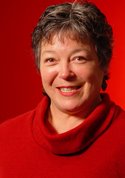Rebecca - No Choice in the Matter
Rebecca -

I have no idea what inspired me to be a nurse, but what I do believe is that for me, nursing is now and has always been, a calling.
I am happiest when I am taking care of patients and their loved ones..
My confidence in my nursing skills and knowledge continued to rise by surviving the regimented nurse-in-the-cap-and-cape era, managing a family, an extensive education, and ever-changing career, and by learning to stand up for what I believe is right for patients.
I started nursing school at a young age, and I lacked confidence in my ability to learn what I needed to perform this complex role. "I actually don't think I chose nursing. I believe it chose me. That said, I can't imagine doing anything else." As a result of my insecurity, I did not complete training at that time. I think I underestimated my ability and desire, because I naturally sought a position as a nurse's aide. I worked for a couple of years, and as I gained confidence and skill, began to realize that I could do this work. I wanted to be able to continue to advance so I was accepted into a program to train practical nurses.
Following graduation I passed the examination for licensure and became a Licensed Practical Nurse. As an LPN for six years, I was able to work in many areas of nursing, and I continued to gain skills and confidence. What I gained most was the realization that I must be continually challenged. Often times, the LPN is assigned to roles that Registered Nurses also perform when a vacancy occurs. Through these assignments, I discovered that I could also excel in meeting the expectations of these roles, but in order to continue in them on a more permanent basis, I would need to go back to school. I was accepted at nursing school and ultimately passed the licensing exam and became a Registered Nurse.
I finally found my niche in the early 70's when the first critical care units for heart patients began to emerge. These units were called Coronary Care Units (CCU). There was something about this specialty that seemed almost second nature to me, and I soon realized that this type of nursing was really where I wanted to stay. This translated a few years later into a very long and satisfying role taking care of heart surgery patients in the operating room.
As I mentioned, I need to be continually challenged and over the years, I've looked for ways to learn new things, improved my skills, and use my talents in many ways. Although I never thought I wanted to teach, I've come to learn that I love teaching people about health care and nursing. I've volunteered for the Red Cross, taught classes to emergency medical technicians, army medics, army nurses, and patients. I've lectured locally, at the state and national levels, and internationally for many groups.
As a young nurse, I had always desired to take my formal education as far as I could, but with demands of raising a family, working full time, and traveling with the military, that goal did not seem to be within my reach. I had taken some college courses early in that process, but never completed the degree requirements. Once the children were launched and the military moving slowed down, I regained that desire and dove in head first to continuing my educational goals. I completed the degree I had begun years before and charged into my nursing baccalaureate and masters degrees. I received my Master of Nursing degree in 1998.
Some might call me an academic snob, but I am so appreciative of the new perspective I developed as a result of that formalized education. It added a dimension to my love of nursing that I never knew was possible. A professor of mine once said, "going back to school is a personal thing," and it is true. It is difficult to explain the personal growth that comes with education. I continue to appreciate the talents of my colleagues and encourage them to explore the possibility of continuing their education.
Now, four decades into my work in health care, professional satisfaction is realized from participating in a more global capacity. With newly acquired learning in the areas of regulatory compliance in healthcare, I am able to examine systems, coach providers, and educate colleages, law makers, and consumers.
At this time in my life and career, I have developed a commitment to the profession of nursing and also to my colleagues in nursing. My involvement with professional organizations - The American Nurses Association and the Association of periOperative Registered Nurses - has had a significant impact in encouraging that commitment.
We must all work together to establish nursing as a true profession. We have to preserve our legacy and at the same time guide the future of nursing with vision to the possibilities. I miss working with patients and their families, but I love my new role in mentoring others. Together we have a common goal; that of the safe care of patients. The learning and skills I've gained over the years, thanks to my mentors, allows me to continue to give to this profession what I love.
What's especially important to me now is sharing with other nurses the abundance of opportunity our profession offers. The farther you go in terms of your education and preparation, the more opportunities are open to you...you can really have an impact on what happens to people and the world in this profession.
I like to say to nurses I mentor: Show up! Open up! Speak up!
Power Strategy: Determination, Inspiration, Learning
go back to main page


